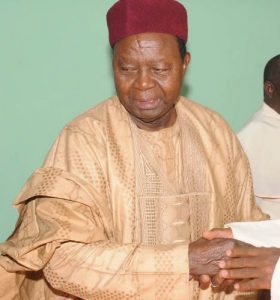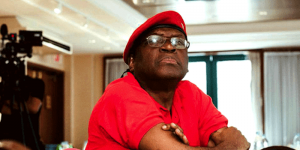By Adagbo Onoja
It was always a big debate between the two of us in that quiet corner of his choice sit-out in Zone 7 in Abuja. It served as the site for our reconnection rites after both of us were back in the country, he from being Chief de cabinet of the ACP-EU and I as a knowledge seeker. Memories of our encounters in that space constitute the source of the sadness that one never heard, not to talk of being at his bedside to bid him bye to Heaven’s gate. Whatever killed him – an old infection, Covid-19, bungling Nigerian hospital or unseen forces – his demise is made sadder by it coming on the heels of Dr. Yima Sen and Prof David Ker, some of the best and the brightest around.

Chief Solomon Lar, the grandmaster’s grandmaster
Many issues came up at every encounter at that sit-out sessions with Dr. Obed, which is what we called him. It ranged from his argument for my reconciliation with Alhaji Sule Lamido to academic debates in Europe, the ‘African condition’ down to the Middle Belt conundrum. I could sense he was deeply pained about violence across Southern Kaduna, Plateau and Benue State. But, like Prof Jerry Gana and Bishop Mathew Hassan Kukah before him, he too had no model of a response to the crisis beyond discursive railing against what Vanderbilt University’s Moses Ochonu calls the Caliphate imaginary in the context of colonialism within colonialism. In other words, Mailafia, Jerry Gana, Mathew Hassan Kukah and all other vocal elements centralising that category constitute a category that contrasts with Chief Solomon Lar and, before him, Senator Joseph Tarka in terms of a more dynamic model of contesting hegemony. In between the Tarka/Lar bracket and their Gana/Kukah/Mailafia other could be found General TY Danjuma who joined Gana/Kukah/Mailafia bracket but after attaining referentiality in professionalism. His own limitations have to do with his being a military mind as opposed to a politician and then the radius of those who had access to him vis-à-vis the options they might have placed before him for handling the Middle Belt conundrum in Nigerian politics. It is difficult to contemplate the opportunity the Middle Belt would have lost in the TY persona by the time the man is no longer on the scene. May the good Lord preserve him longer than he might have been predestined in relation to the possibility of the discovery and accomplishment of what should have been his real legacy for the Middle Belt, the North, Nigeria and the world.
This background notwithstanding, Obed Mailafia would be remembered for his many contributions. One of them is the signifier that he, like Prof Jerry Gana, is in terms of how far a child from where he comes from in Nigeria could climb in spite of inherent disadvantages. His going to Oxford University speaks to that, making him a beacon or model of heights attainable by others who suffer such locational and identity disadvantages. I compare him to Jerry Gana who became a professor at a time such was a “solid personal achievement” in Nigeria before those who brought him to limelight found him worthy of being brought up.
Obed’s second main contribution would be in becoming the Deputy-Governor of the Central Bank of Nigeria. That was not just expanding the space attainable by somebody of a humble origin but also reinforcing the tradition of raising the bar of merit. He became DG by seeking qualitative grooming for such Olympian technocratic spaces. Of course, he wished he became the Governor of the CBN, but he did not need to. By becoming the Deputy-Governor, he already sent a message to the folks back at base that ‘they’ too could go that far too.
Three, he was deeply concerned about the violent developments in Southern Kaduna, Plateau and Benue states, especially in the past few years. This was not chauvinism but a perfectly understandable concern in the light of the history of violence- structural and physical – that defined the relationship of the identity categories involved. But even more crucial is his critique of internal colonialism in the Middle Belt as in the case of Tiv monopoly of the office of the Governor in Benue State and against which he spoke out at the two day conference on Herdsmen and Farmers Conflict in Central Nigeria at the Benue State University in Makurdi from March 16th and 17th, 2017.
The fourth is his resort to the power of voice in disciplining the Nigerian crisis. His column has since the last three years become a source of critical takes on the way forward for both those who share his standpoint and those who did not.

Experimenting with the strategy of the power of voice

The late Dr Yima Sen
His fifth main contribution is advancing to seek power and power at the peak – The Presidency. He didn’t go far but his move had a rupturing effect on the psychology that only moneymen and women, older people or persons of certain ethno-regional identity could even contemplate the office. The paradox is that this was the point of our break-up. It occurred on two points. The first is the view he and a Middle Belt professor of Law have that I detest being politically interested in the Middle Belt. Nothing could be farther from the truth. My reply has always been that nobody even knows me in the Middle Belt beyond the small circle of comrades and activists. Two, I am certain no politician in the Middle Belt would entrust me with what I was allowed to do in Government House, Dutse in Jigawa State. The reason for that is that whatever I was doing in Jigawa was never beyond contributing ideas. The ideas were not suspected because they were galvanized from radical civil society activism, the same source to which the governor also traced his ideological roots. It is not about whether Lamido was faithful or not to the spirit of radical roots. It is about my finding myself a part of a regime that it was in my own ideological interests to position and protect. So, we had a binder which was never in my being an adviser and he being the governor. This is not the relationship I would have with every other politician. Above all, nobody suspected me of any agenda- open or hidden- in Jigawa State. Everyone knew that the longest I could last is the 8 years of Sule Lamido’s tenure. I could not expect to be a Minister or legislator or even Local Government chairperson in Jigawa. This contrasts to the suspicion that was certain to arise if I were to have the opportunity to do even half of what I am perceived to have done in Jigawa State anywhere in the Middle Belt. I am sure some people would say I was preparing myself secretly for governorship even when it is being a solid academic I seek, not a governor. Dr. Obed was never totally convinced on this point even though he knew I also hadn’t that kind of money even if I had the knack to be a politician.
The second dimension of the paradox was what happened on September 1st, 2018, the day what was to be the war cabinet for his presidential ambition had its inaugural meeting. My contribution there alienated me. His comments when he was seeing me off suggested he understood what I was saying but certainly not the rest of the members except the professor who saved the day, somehow. I was asking what grand narrative was going to underpin his campaign, cautioning against the temptation of high flown slogans that could alienate any voting bloc. Many people in the room didn’t understand that point. One was particularly aggressive against the point that the Middle Belt is not politically or materially rich to enthrone a president all on its own. But I still had my plate of fried rice at the end of the day.
That is the last we met physically. But Obed was, by nature, incapable of viciousness. For instance, each time I made a television appearance, he would send a comment such as the one of April 12th, 2019 which reads, “Saw you on NTA the other day. Your analysis was solid!” Or to ask after me if something threatening was up such as the one on May 6th, 2020: Adagbo, good morning. I hope you are doing well and keeping safe, all of you. Shalom!”
The most touching was on November 11th, 2020 when he sent a text praising me to high Heavens for a piece by me he had read in ThisDay earlier that day on the late Dr. Yima Sen. I had no idea that the Committee on Dr. Yima’s burial had decided that the piece I contributed in drafting be published in my name. So, Obed’s text set me thinking whether he wasn’t mistaking another Onoja for mine. When we got talking on the phone, he was correct and I was wrong. And the discussion drifted to other things. But the Whatsapp became the main channel for our interaction. It is either he was sending to me a clip of Sule Lamido media appearance or he was educating me about the Kerala Socialist Indian province. He was absolutely vast. I don’t know if he included me among two other Middle Belt women warriors he felt disappointed him during his presidential contest. I am sure that whatever he thought of me, he knew my reasons for every standpoint, including those he did not agree with and which are many.
Both those who accepted and those who did not accept his own standpoint on the Nigerian condition would miss him. On the whole, he will always be a reminder for why many of the best and brightest from the region are driven to frustration and anger as to adopt an intellectual form of guerrilla warfare against the system in the North. In other words, Dr. Obadiah Malafia compels us to reflect on the Chief Solomon Lar and Senator Joseph Tarka models of managing the same conundrum. This, we shall try to do in part 2 of this painful tribute to a consummate Christian humanist who has left the lounge too soon!




























